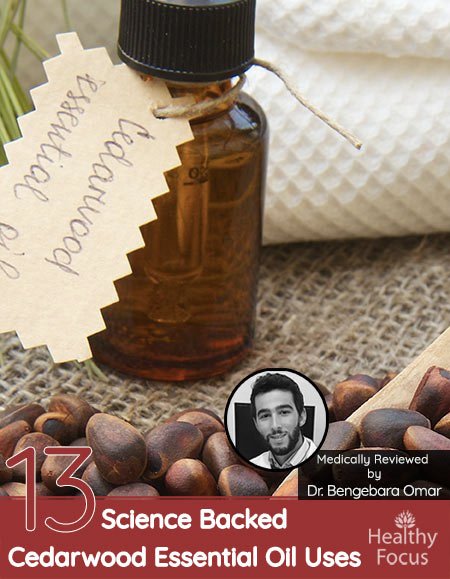Last Updated on September 2, 2023 by Marc Seward
 Medically Reviewed by Dr. BENGEBARA Omar
Medically Reviewed by Dr. BENGEBARA OmarMD, ER Doctor & Surgery Resident – Reviewed & Approved on November 05, 2018
What is Cedarwood Essential Oil?
Many people will be familiar enough with Cedarwood oil especially for its aromatic qualities and its well-known use as an insect repellent. But there is actually much more to cedarwood oil beyond its aromatherapy benefits.
Cedarwood essential oil has a wealth of health and therapeutic uses, both physical and psychological. It is the general wellness benefits that make it a very welcome addition to your medicine cabinet. Cedarwood essential oil has been around for a long time; a very long time indeed.
It is mentioned regularly in the bible and it is thought to be one of the first essential oils extracted from nature.
The ancient Egyptians made use of it for embalming practices.
These days it is extracted from the wood or needles of the cedar wood tree by steam distillation.
- Atlas Cedarwood (Cedrus atlantica)
- Himalayan Cedarwood (Cedrus deodara)-with oil from either the wood or needles.
- Virginia Cedarwood (Juniperus virginiana)
- Texas Cedarwood (Juniperus Mexicana)
So you need to check which genus and species you are getting–2 are actual “cedar” and 2 are Juniper. Each has a different composition and differing benefits.
The composition of Cedarwood Oil
There are slight differences between the cedarwood oil species as Atlas and Himalayan are from the Cedar genus where Virginia and Texas are from the Juniper genus.
All of the oils contain Sesquiterpenes but different key compounds. Atlas and Himalayan Cedarwood typically have Alpha-pinene and Himachalol as key compounds.
The Juniper based oils contain high levels of Cedrol and Thujopsene.
The oil made from the needles it is a different oil altogether with Alpha-Terpineol, Linalool, and Limonene being the primary compounds.
The needle-based oil is closer to Bergamot in composition than to the other wood base oils. It is rarer and not typically found in the west.
While the scent of these oils may be similar the composition and specific therapeutic properties are not.
Possible Substitute Oils with similar properties include frankincense; sandalwood and cypress oils.
Cedarwood oil blends well with the following oils: bergamot, cinnamon, jasmine, lemon, neroli, patchouli, pine, rose, ravensara, sandalwood, thyme, and vetiver.
Properties of Cedarwood Essential Oil
Cedarwood essential oil derives its wide-ranging medicinal uses from its therapeutic properties which include…
- Antiseborrhoeic qualities which make Cedarwood essential oil of great use in tackling skin complaints like eczema.
- Antiseptic qualities which help to treat wounds and protect against bacteria.
- Anti-inflammatory properties which may have potential to treat a range of complaints including rheumatism.
- Astringent properties that can benefit muscle and skin tone.
- Sedative qualities which have a wide range of mental and physical benefits.
Cedarwood Essential Oil Uses
Hair Growth
Your hair is very visible; healthy, good-looking hair is a very important aspect of our overall personality. If you are worried about the damage you are causing to your hair from frequent washing, blowing, heating and manipulating then cedarwood essential oil can help you to strengthen and breathe some new life into it.
Cedarwood oil stimulates and strengthens your hair follicles and promotes blood circulation to your scalp.
Research into the use of essential oils for alopecia patients demonstrated that cedarwood essential oil in combination with thyme, rosemary, and lavender had a safe and significant effect on a high percentage of the patients. (1)
While it did not work for everyone about 44% of the users experienced an improvement. The improvement scale was based on % of hair regrowth.
A slight improvement was a 10-30%, A marked improvement was 31-50%, A Very Good was 51-80% and an excellent improvement was 81-100% regrowth.
Of those with an improvement, about 40% saw a slight or marked improvement and 58% had a very good or excellent improvement.
Every hair loss situation is different–so if it works for you—there is a very good chance it can work very well. To use cedarwood essential oil on your hair, just add a few drops to your shampoo or massage it directly into the scalp.
The study found no side effects and determined it is safe to add to your daily hair care routine.
For Acne, Eczema and Dry Scalp
One of the most common applications of cedarwood essential oil is in skin treatment. It can be used to safely and effectively treat a number of skin conditions.
Eczema: One of the many uses of cedarwood oil is its ability to treat eczema. Cedarwood essential oil regulates the production of sebum and reduces the symptomatic skin peeling associated with eczema. It also helps to treat any inflammation and infection of the skin caused by the condition.
- Simply add a few drops of cedarwood oil to your skin cream and rub it into the affected areas or you can add 4 or 5 drops to your bathwater to help soothe the skin.
- Seborrheic Dermatitis (sometimes called Seborrheic Eczema): Seborrheic Dermatitis is caused by an inflammatory reaction to certain yeasts on the skin. Cedarwood’s anti-fungal and antimicrobial properties can make it a natural alternative for topical anti-fungal medications like ketoconazole.
Acne: Cedarwood essential oil can also help to treat and protect your skin against unsightly acne. It prevents clogging of the pores of your skin and protects it from intrusion by harmful particles and bacteria.
- To treat acne with essential oil, add a drop or two to your soap or lotion and use daily. You could also add cedarwood oil to coconut oil and some oatmeal to make your own facial scrub.
Dry scalp: Cedarwood essential oil promotes healthy blood circulation to your scalp and helps to reduce any dryness or itching that you might be experiencing.
- You can add a few drops to your shampoo or just massage it into your scalp and let it rest for 20 minutes or so before rinsing it out.
Insect repellent
Where I live, mosquitos are a real problem. They especially enjoy feeding on my young daughters so cedarwood essential oil’s ability to repel mosquitos and other bugs was the reason I was attracted to it in the first place.
I have found that it is very effective in keeping the mosquitos at bay and there has even been some research to suggest that it would be a safe and effective ingredient for commercial pesticides. (2)
You can also add it to Lemon Eucalyptus Oil to make a powerful and natural mosquito blend.
- If you need a safe, effective bug repellant you can make your own by adding 4 or 5 drops of cedarwood essential oil to an ounce of water in a spray bottle. You can also put a few drops on your bed sheets or pillows to keep the little intruders away through the night.
- Cedarwood oil was also found to be useful against fleas and should be safe to use on dogs. Be careful to test for a reaction first. Then you can carefully spray your dog or dip a washcloth into a diluted solution (4-6 drops per ounce of water) and rub onto the dog. Be careful the dog does not get any solution near the mouth or eyes.
Arthritis and Rheumatism
Because of its anti-inflammatory qualities, cedarwood essential oil is often used to treat the pains and stiffness of the joints associated with arthritis and rheumatism.
- You can make a soothing massage blend by diluting your cedarwood oil with a carrier oil and rubbing it into the affected joints and muscles or add 5 to 10 drops to your hot bath.
Respiratory Problems
Cedarwood essential oil can be used to help ease the breathing symptoms that are common sicknesses like colds or the flu. Coughing and congestion is something we are all familiar with and we all know how annoying and disruptive these symptoms can be.
Cedarwood essential oil can help relieve clear phlegm and clear other breathing difficulties that come hand in hand with your flu or cold.
Himalayan Cedarwood is a strong 5-LOX inhibitor. Overproduction of 5-LOX can result in triggering inflammation and asthma.
- Simply rub a few drops on your chest before bed or sniff the oil directly from the bottle when needed. Make a steam bath by adding a few drops to a sink full of hot water; cover your head with a towel and inhale the vapors for 5 minutes.
Sleep and Stress Relief
As well as treating a number of physical complaints, cedarwood essential has natural sedative properties and can be used to combat stress and ease tension.
It has a calming effect on the mind and for those with any sort of sleeping problem; it can encourage you to get a decent, uninterrupted night’s sleep.
It is so effective on the mind because its aroma promotes the release of serotonin in the brain which gets converted to melatonin which encourages restful sleep and a calm mind. There is evidence of its effectiveness as a sedative in this piece of research carried out on rats. (3)
- If you are feeling in any way tense, stressed or depressed try inhaling cedarwood essential oil from the bottle or put a few drops on a handkerchief and breathe it in whenever you feel the need. You can also get all the benefits of its aromatic properties by diffusing cedarwood essential oil in a diffuser machine.
Minor Wounds
Cedarwood essential oil has antiseptic properties which can help to treat minor wounds or skin damage.
- Make your own balm by adding a few drops of cedarwood oil to coconut oil and simply rub it gently into the affected area.
Research backs this remedy up.
A 2012 study investigated the wound-healing and anti-inflammatory activities of Cedarwood oil. In this study, Juniperus virginiana Cedarwood oil was tested along with Western Juniper oil. Both oils exhibited wound-healing and anti-inflammatory activities.
For this specific study, Western Juniper oil showed even better-wound healing activity. (8)
Tightens Muscles
Because of its astringent properties, cedarwood essential oil can be massaged into your body to tighten the skin and improve the quality of your muscle tone leaving you feeling firmer and generally rejuvenated.
- Make your own massage oil by diluting your cedarwood essential oil with a suitable carrier oil. Coconut, jojoba and almond oil are popular carrier oils but there are many healthy oils that work equally as well.
Fungal Infections
There is growing evidence demonstrating that many essential oils can be used effectively in treating a variety of fungal infections. Cedarwood essential oil is just one of many oils that researchers see as alternatives to more regularly prescribed antifungal and antibacterial medications.
For Pain Relief
Cedarwood oil has analgesic and anti-inflammatory properties. Animal studies have shown Himalayan Cedarwood (Cedrus deodara) reduces pain and inflammation. (4)
Other studies have looked into the mechanisms of action and found that cedarwood is a 5-LOX inhibitor. 5-LOX is a producer of inflammatory leukotrienes that are responsible for the inflammation response—related to pain and especially asthma. Out of all of the Cedarwood species, the Himalayan cedarwood was the strongest 5-LOX inhibitor followed by the atlas cedarwood. (5)
It Smells Great
Even if you do not have any medicinal reason for using cedarwood essential oil, its scent it a good enough reason.
The scent of cedarwood is best described as a delightful, woody, balsamic aroma will have your house smelling great and should work wonders on your mind. The cedarwood scent can also be used on its own or in a blend as a homemade deodorant. As always, make sure to test on a small area of your skin before using on a larger area of your body.
For ADHD and Focus
Cedarwood oil may help improve focus in children with ADHD. A recent study done using Lavender, Vetiver oil and Atlas Cedarwood oil (Cedrus atlantica) was done to determine which oils might help in improving focus. The Vetiver and Cedarwood groups showed a significant benefit with a mean improvement in scores of 32%. (6)
The study authors also note that parents of the children said they saw behavioral improvements at home and in the classroom.
Diuretic Properties
Cedarwood essential oil has natural diuretic properties meaning that it helps promote both the volume of urine produced and the frequency at which a person urinates.
Diuretic pills are used for various conditions but come with the risk of side effects. natural diuretics like cedarwood can be used as a replacement where water pills are prescribed but always consult your doctor before using a natural remedy as a replacement.
As a diuretic, cedarwood essential oil might help to eliminate toxins from the system and help you to detox the body naturally. It may also help relieve a urinary tract infection or kidney trouble.
Try rubbing a few drops of cedarwood oil into your abdomen or bladder region to help eliminate waste or excess fluids from your system.
New Research on Cedarwood Oil
We found some interesting research work on some potential uses for cedarwood oil. Sometimes it was used with other oils and sometimes by itself.
Wood Oils (including Cedarwood Oil) and Cancer
Cedarwood oil also has anticancer potential. A study showed that certain wood oils were cytotoxic to multi-drug resistant leukemia cells.
The wood oils used were Juniperus oxycedrus, Cedrus libani, and Pinus pinea wood essential oils (Juniper/Mediterranean Cedarwood and Pine).
The authors concluded that these wood-based essential oils might be useful to treat tumors resistant to the traditional drugs. (7)
Best ways to use Cedarwood Oil
- Diffuse Cedarwood oil using a ratio of 1 teaspoon of carrier oil to 2-5 drops of Cedarwood oil.
- Inhale directly from the bottle or add a few drops to a sink filled with warm water
- Massage Cedarwood oil into sore muscles using the 1 tsp to 2-5 drops ratio
- Spray diluted Cedarwood oil for skin care
- Add a few drops of Cedarwood Oil to your bath
Frequently Asked Questions
1) Where is Cedarwood Essential Oil Derived from?
Cedarwood essential oils can be derived from several types of tree. The 2 cedarwood trees used to make true cedarwood essential oils are Himalayan cedarwood and Atlas cedarwood.
The essential oil is derived by a steam distillation process using the wood of these trees.
2) What are its Main Health Benefits?
Cedarwood essential oil has countless health benefits. Some of the most common uses are to treat arthritis and pain, relieve respiratory conditions and treat the skin, hair, and scalp.
As well as its physical benefits, cedarwood essential oil can be used to treat a range of emotional issues. It can help relieve stress and anxiety, promote relaxation and sleep and even improve focus in people with attention deficit disorder.
3) What other Essential Oils does it Blend with?
Like most essential oils, you can get even more out of cedarwood oil by blending it with other oils.
Cedarwood has strong base notes that combine especially well with bergamot, frankincense, juniper, neroli, jasmine, clary sage and lavender essential oil.
4) How does it Work?
The reason that cedarwood essential oil has so many diverse uses can be attributed to its wide range of medicinal properties.
Cedarwood oil is anti-inflammatory, anti-fungal, antiseptic, astringent, diuretic and sedative in nature.
5) Has it been Studied Scientifically?
Yes, it has. There is a growing body of evidence that cedarwood essential oil can help treat a wide range of physical and emotional conditions.
We have links to 8 scientific journals that we have compiled below.
6) Is it Safe?
Cedarwood essential oil is considered safe for external use as long as it is diluted with a carrier oil.
It should never be used internally and pregnant women should consult their doctor to make sure that it is safe to use.
Cedarwood Essential Oil Side Effects and Precautions
- There is some disagreement but it is generally recommended that pregnant women should avoid using cedarwood essential oil. In any case, be careful and consult your doctor first.
- Like most essential oils, it is best to dilute cedarwood essential oil with a carrier oil before applying it topically. Up to a 5% dilution should be safe for adult use—which equates to about 30 drops of oil per ounce of carrier oil.
- Although it is not recommended to ingest any essential oil Cedarwood essential oil should definitely not be ingested.
- Cedarwood oil is fairly safe and can be used for Children if properly diluted to under 3% dilution. Cedarwood is not recommended at any dilution for small children under the age of 1. In general for Children over 1, a 1% or less dilution is safest (6 or fewer drops of oil per ounce of carrier oil). The quality of the oil is important. Organic oils are preferred – but there is typically little pesticide or fungicide use for cedarwood trees.
The species of oil is also important depending on your intended use. This is not to say that all oils won’t have a benefit—they are somewhat similar.
But for specific purposes, it is best to stick with what was actually used in the study—as there are chemical differences and we do not know exactly what compounds exhibit the benefits.
- If you are looking for the anti-inflammatory (5-LOX inhibition) the Himalayan oil is best (Cedrus deodara).
- For the ADHD benefits then the Atlas Cedarwood oil (cedrus atlantica) is better according to the studies.
- For the hair regrowth blend, the Atlas Cedarwood oil was also used.
Amazon Options for Different Cedarwood Oils
(1) http://www.ncbi.nlm.nih.gov/pubmed/9828867
(2) http://www.ncbi.nlm.nih.gov/pubmed/24276200
(3) http://www.ncbi.nlm.nih.gov/pubmed/12898420
(4) http://www.ncbi.nlm.nih.gov/pubmed/10350366
(5)https://www.researchgate.net/publication/222477118_Preliminary_studies_on_the_immunomodulatory_activity_of_Cedrus_deodara_wood_oil
(6)http://files.meetup.com/1481956/ADHD%20Research%20by%20Dr.%20Terry%20Friedmann.pdf
(7) http://www.ncbi.nlm.nih.gov/pubmed/23154840
(8) http://www.ncbi.nlm.nih.gov/pubmed/23297713



Leave a Reply
You must be logged in to post a comment.